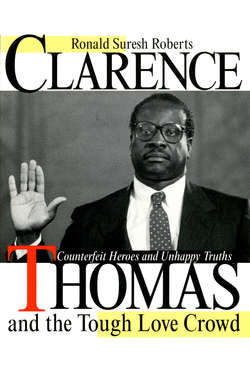Читать книгу Clarence Thomas and the Tough Love Crowd - Ronald Suresh Roberts - Страница 16
На сайте Литреса книга снята с продажи.
2 Julien Benda’s Constitution
ОглавлениеNever were there so many political works among those which ought to be the mirror of disinterested intelligence.
—Julien Benda, The Betrayal of the Clerks
I am an intellectual not a leader. I observe what others are doing and try to stand apart from it as I analyze it.
—Stephen Carter, Reflections of an Affirmative Action Baby
Julien Benda (1867–1956) was a French writer and philosopher who powerfully defended the purity of reason against what he saw as decadent contemporary intellectual movements. He belittled emotion, intuition, and sensation. Benda’s La Trahison des Clercs is easily the most influential rendition of the tradition of disinterested truth seeking. Roland Barthes has commented that “a small study could be done on the contemporary descendants of Julien Benda” and that Benda’s intellectual ideal seems “an attitude of mind destined to travel imperturbably across the ages.”1 Yet this ostensibly disinterested tradition was, for Benda himself, frankly intended to promote a conservative political agenda and to suppress what he viewed as misguided Utopian activism. Benda scathingly dismissed those who sought to change the political world. He instead addressed those “whose activity essentially is not the pursuit of practical aims, all these who seek their joy in the practice of an art or a science or metaphysical speculation, in short in the possession of non-material advantages, and hence in a manner say ‘My Kingdom is not of this world.’”
Stephen Carter, too, is concerned to shore up “the wall that traditionally kept those who lived the life of the mind separate from the world in which they lived it.”2 Having ostensibly renounced the affairs of the world, having ostensibly opted for nonmaterial advantage even while living in manifest material comfort, Julien Benda advocated impersonal ideals: “Man belongs neither to his language nor to his race; he belongs only to himself, for he is a free being, that is, a moral being.”
Randall Kennedy, too, has argued that in meritorious scholarship “race, nationality, religion, class and personal qualities as such are irrelevant.” Justice Thomas described his debates at the EEOC as “unfettered” and “liberating.”3 For Thomas, as for Benda, lay passions fetter truth. V. S. Naipaul, for his part, dismisses entire genres of writing because they are “missionary stuff being passed off as scholarship.” And at the height of the Guinier controversy, Harvard Law School professor Mary Ann Glendon took to the pages of the Wall Street Journal to accuse Guinier of a sacrilegious confusion of advocacy with scholarship. Meanwhile, the New York Times opened up its coverage of the Guinier affair with the headline, “Guerrilla Fighter for Civil Rights.” Guinier, it was widely argued, transgressed ideals of impartiality and of disinterested professionalism.
Yet there is much evidence, in the Guinier affair, in political clashes generally, and in Benda’s essay itself, that this rhetoric of impartiality is itself avowedly a political tactic. Benda was, despite contrary appearances, entirely concerned with the real world: “My subject is the influence that the clerks have had in the world, and not what they were in themselves.” And he believed that intellectuals could exert actual influence in society since the “adhesion of the ‘clerks’ to the passions of the layman fortifies these passions in the hearts of the latter.” Benda urged that, rather than fortify lay passions, the intellectual’s true function is to deflate social unrest: “In bringing this partiality to historical narrative the modern ‘clerk’ most seriously derogates from his true function, if I am right in saying that his function is to restrain the passions of the layman.”
The Toughs work within this ideal. For Benda, the civic sphere was inveterately consumed by passions (Step One); but the clerks could (and ought) to resist this taint as the best way to restrain those unfortunate, inevitable passions (Step Two); and the question of remedying the underlying grievances never arose, because those grievances were not rational, merely passionate (Step Three). For Thomas, society is inveterately race conscious (Step One); but the policymaker can (and ought) to resist this taint as the best way to restrain those unfortunate, inevitable racial passions (Step Two); and the question of remedying the grievances underlying racial passions is suppressed because impassioned grievances are not “rational,” merely passionate (Step Three). These three steps are entirely explicit in Thomas’s response to Derrick Bell’s work, printed in the Wall Street Journal and suggestively headlined “The Black Experience: Rage and Reality.”4 The remaining question is whether the Tough Love Crowd’s Bendaresque pedigree and the antipassion campaign that goes along with it perhaps undo their racial-justice allegiances.
